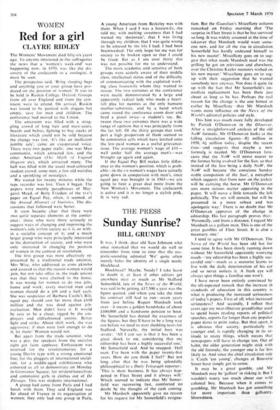WOMEN
Red for a girl
CLAYRE RIDLEY
The Womens' Movement died fifty-six years ago. To anyone interested in the suffragettes the news that a 'women's week-end' was happening now, in 1970, was like the dis- covery of the coelacanth to a zoologist; it must be seen.
The prospectus said, 'Bring sleeping bags and anything you or your group have pro- duced on the position of women.' It was to be held in Ruskin College, Oxford. Groups from all over England and from the con- tinent were to attend. On arrival,' Ruskin was found to be painted with slogans but empty, save for men and children. The conference had moved to the Union.
The anteroom was filled with a strug- gling crowd of long hair and maxi-coats, beards and babies, fighting to buy stacks of literature which could not be sold because the change was lost. 'It's like an inefficient jumble sale', came an exasperated voice. There were two paper stalls: one was Mao communist, which attracted few, and the other American (The Myth of Vaginal Orgasm etc), which attracted many. The hall was filled with the usual mud-coloured student crowd, some men, a few old weirdies and a sprinkling of nostalgics.
We waited for twenty minutes while the tape recorder was lost. Then it began. The papers were mainly paraphrases of Mar- garet Mead, of Betty Friedan, of the Tuc's paper on Equal Pay, often, it seemed, of the Annual Abstract of Statistics. The dis- cussions that followed were better.
It soon became clear that there were two quite separate elements at the confer- ence: those who were there seriously to suggest ways of changing and improving the woman's role within society as it is, or with- in a socialist concept of it; and a much larger group who were principally interested in the destruction of society, and who were only interested in changing the position of women in the context of revolution.
The first group was most effectively re- presented by a traditional trade unionist, Mrs Wise, who addressed us arms akimbo and assured us that the reason women would join, but not take office in. the trade unions was that they were chained to the home. It was wrong for women to do two jobs, home and work; every married man and woman should do a job and a half each. She was suspicious of Barbara Castle's Bill; equal pay should cost far more than £600 million and she was dead against job- evaluation. Men didn't have it. It would be sure to be a cheat, rigged by the em- ployers and oldfashioned unions. Better fight and strike. About shift work, she was aggressive; if men were fool enough to do it, let them! Women would not.
But apart from the trade unionist, who was a pro. the speakers from the socialist right got faint applause. Enthusiasm was reserved for the revolutionaries; for a young Devlin type with a strong emotional line; for the pluggers of international social- ism; for a middle-aged exhibitionist who exhorted us all to demonstrate on Monday in Grosvenor Square; for stridentoanarchists and communist girls in clothes out of Dr Zhivago. This was students international.
A group had come from Paris and I had lunch with them. They said England was far ahead of France in its organisation of women; they only had one group in Paris,
A young American from Berkeley was with them. When I said I was a housewife, she told me, with melting sweetness that I had wasted my 'doctorate', that I was living through my children, that 1 was quite wrong to be amused by the life I had; I had been brainwashed. The only hope for me was for society to be broken open so that I could be freed. But as I am over thirty this was not possible for me to understand.
The more academic and sensitive of both groups were acutely aware of their middle class, intellectual status and of the difficulty of communicating with the exploited work- ing class housewife whom they wanted to rescue. The two extremes at the conference were neatly demonstrated by a large and apparently radical lady who made a heart- felt plea for nannies as the only humane mother-substitute, and by a hand which came round the conference room door and fired a pistol twice—a student's toy. Be- tween these two extremes there was a wide range of opinion, but it was principally from the far left. Of the thirty groups that took part a high proportion of them seemed to be communist cells which have latched onto the low-paid woman as a useful grievance- issue. The average woman's wage of £11— well under half the average man's—was brought up again and again.
If the Equal Pay Bill makes little differ- ence to the woman's position, which is prob- able—in the us women's wages have actually gone down in comparison with men's, since equal pay was brought in in 1963—we are going to hear a great deal more from the New Women's Movement. The coelacanth is active and it is no longer a stylish pink, It is very red.


































 Previous page
Previous page